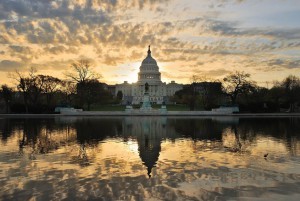On the Hill: Senators Discuss Religious Diversity

America’s religious makeup is changing in the new millennium, according to a recent Pew poll that shows the number of American Christians declining while the population of atheists and the nonreligious has increased to nearly 23 percent of the total population. This poll, and the various public battles over religious freedom that have occurred over the past few years, were the topic of conversation at an event in the US Senate last week featuring Senators Tim Kaine (D-VA), Chris Coons (D-DE), and James Lankford (R-OK).
At this event, which was sponsored by the Associated Press and the Pew Research Center, the senators were asked not only about their personal religious journey but about their thoughts on the rapidly changing American religious landscape.
Senators Coons and Lankford spent most of their time discussing their extensive missionary trips while Senator Kaine discussed his own struggles with faith in college and his return to Catholicism in the years following his graduation. Although the personal narratives of their faith journeys were interesting to hear, the senators’ perspectives on the “culture wars” was very telling as to their personal thoughts on the separation between church and state.
For Senator Lankford, religious freedom requires not only the ability to pray as one sees fit but the right to “live one’s faith.” According to Lankford, this means that private citizens must have the ability to put the commandments of their faith into action, even if the practical result of this would mean religiously motivated discrimination against the LGBTQ community. Lankford also supports religious exemptions from laws, such as exemptions for religious communities under Obamacare and the right of individuals to refuse service to those who live life in a way contrary to Christian teachings.
While Lankford didn’t explain whether his thoughts applied only to private business owners who wish to refuse service to LGBTQ couples or also to government officials like Kim Davis, his message was clear: religious Americans shouldn’t be bound by some publically applicable laws if the dictates of their faith conflict with those laws. Noticeably, Senator Lankford demurred when asked if Mormons in the 1960s should have been able to discriminate against black Americans because of a controversial (and no longer followed) tenet of the Mormon faith. Apparently failing to see the parallel between religiously motivated discrimination against the LGBTQ community and against the black community, Lankford (who has a master’s degree in divinity) claimed he didn’t know enough about the Mormon faith to make a definitive statement on their freedom to discriminate.
Perhaps the most revealing and important takeaway from this event on religious diversity was the fact that the three Senate panelists tasked with discussing religious diversity were all white Christians. Not only does this betray the noticeable lack of religious diversity in the Senate, which is overwhelmingly Christian, but it sends a message to many legislators and the institutions advising them that religious diversity simply means including different Christian denominations. It’s true that the panel was composed of a Catholic, a Baptist, and a Presbyterian and that in the early 1800s such a panel might be considered diverse. But in contemporary America, which has a large number of Jews, Muslims, Hindus, Buddhists, atheists, and nontheists, the entirely Christian religious makeup of the panel tasked with discussing religious diversity is simply unacceptable.
